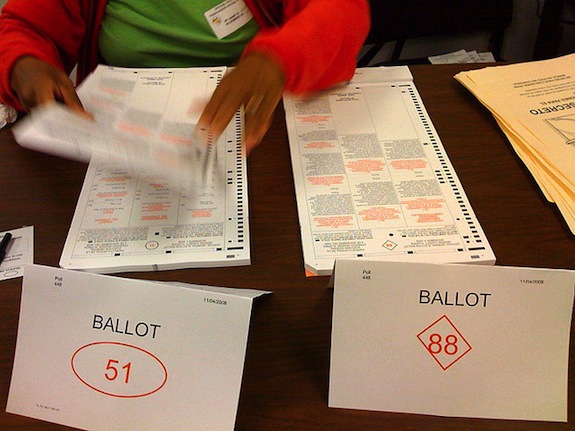
Groups aren’t sold on Florida’s new voter purge after Secretary of State’s tour. (Photo by Erik Hersman)
By Ashley Lopez
Florida Center for Investigative Reporting
As Florida Secretary of State Ken Detzner’s voter purge tour comes to an end, progressive groups have said there are still a lot of unanswered questions.
In the past several days, Detzner has been traveling around the state and sitting down with local election supervisors to talk about Florida’s second attempt to purge non-citizen’s from the state’s voter rolls.
Last year’s voter purge was controversial and was eventually stopped by election supervisors because the state’s list of suspected non-citizens was rife with errors. Right before the 2012 presidential election, news was circulating of many eligible voters getting letters from their respective elections supervisors telling them to prove their citizenship or facing losing their right to vote. In response, elections officials stopped the purge altogether.
This time, state officials said they are working with better information because after a heated fight with federal agencies, the state was able to obtain an immigration database to cross check throughout the process. However, this hasn’t eased the concerns of all election supervisors. The Miami Herald reported:
Florida Secretary of State Ken Detzner’s mea culpa tour to tout the state’s revamped noncitizen voter purge led to a tense exchange Wednesday with an election supervisor miffed about the state’s botched efforts last year.
Palm Beach County Supervisor of Elections Susan Bucher peppered Detzner and his staff with questions about the process and the accuracy of the data to be used in the purge.
“Where does that data come from, how often is it updated: every 10 years or every 10 minutes? … I have a lot of concern that the people we got the database from are saying this is not comprehensive and definitive,” Bucher said during a meeting at Broward County’s Voting Equipment Center in Lauderhill.
Bucher’s questions revolved around the federal SAVE database that the state will use this time to search for non-citizen voters.
Detzner explained that state agencies currently use SAVE data to verify that Floridians are eligible for millions of dollars in entitlements.
“This is the best database we have to deal with,” he said. “This is important to get it right…It can be done and it will be done correctly.”
But Bucher wasn’t satisfied, nor were voting activists who egged her on at times in the audience. A Democrat elected to a nonpartisan office, Bucher continued to ask multiple questions.
Detzner also didn’t announce a timeline for the purge during his tour.
A coalition of multiple civil rights and voting rights groups in the state said in a press release this week that even after five days of Detzner traveling the state and explaining the voter purge, they claim “it is clear that the use of SAVE data is inaccurate, unfair, poorly thought out and alarmingly similar to the error-ridden purges we have seen in the past.”
According to the coalition, their chief concerns with the looming voter purge are:
- The federal SAVE database does not identify whether a person is a citizen or a noncitizen. Designed to verify immigration status in order to determine one’s eligibility for various public benefits, SAVE is a massive compilation of records from numerous other databases about individuals who have interacted with the immigration system over the years. It is not a definitive or accurate list of U.S. citizens, and it should not be used to purge voters.
- Even the Department of Homeland Security acknowledges that the SAVE database is a non-definitive source for determining citizenship. In the agency’s August 2012 agreement with Florida, which allowed the state to access SAVE, it says in writing that “the inability of the SAVE Program to verify [a person’s] citizenship does not necessarily mean that [the person is] not a citizen of the United States and ineligible to vote.”
- Database matching programs are notoriously unreliable. Data entry errors and changing information can produce false matches. Spanish and Creole surnames are especially vulnerable to database input error, while immigration status is particularly complex. Under the purge procedure, Florida’s naturalized citizens may be at risk of getting hit with notice letters, hearing dates, requirements to show their papers, and the costs of replacing lost documents. These confusing and intimidating measures will prevent people from voting, and boils down to treating naturalized citizens differently than those born in the U.S.
Some of the groups who signed on to this is: American Civil Liberties Union of Florida, Fair Elections Legal Network, National Council of La Raza, Progress Florida and SEIU Florida.
Besides being error-ridden, last year’s voter purge list also disproportionately targeted minorities and was halted by a court-order after a voting rights group argued the purge threatened the voting rights of minorities.
However, after the U.S. Supreme Court struck down part of the Voting Rights Act this summer, Florida officials decided to revisit a non-citizen voter purge.
